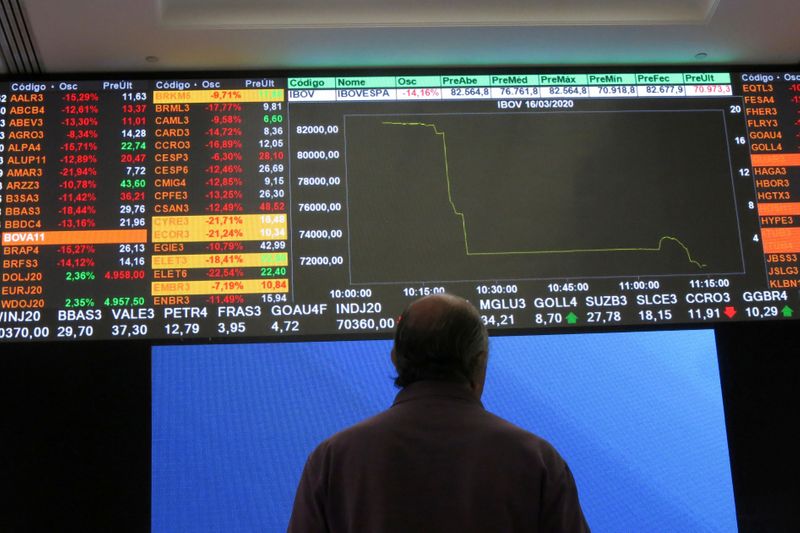By Carolina Mandl
SAO PAULO (Reuters) - The days of marquee global investment banks being shoo-ins for stock market listings could be coming to an end, in Brazil at least.
The Brazilian market for initial public offerings is booming this year despite the pandemic. Yet among the five banks leading managers' rankings in terms of deal volumes, four are domestic, according to Refinitiv data: Itau Unibanco Holding SA (SA:ITUB4), Banco Bradesco SA (SA:BBDC4), XP Inc (O:XP) and Banco BTG (LON:BTG) Pactual SA (SA:BPAC3).
The other is Bank of America (N:BAC).
That's a marked reversal from the same period last year, when four of the top five were major global players - Bank of America, Credit Suisse (S:CSGN), Citi (N:C) and HSBC (L:HSBA) - with just one Brazilian outfit, Banco do Brasil (SA:BBAS3).
Still, industry experts caution that, despite the shifting trends in 2020, it is too early to call a structural change in a market for IPOs that has been dominated by global banks for years.
Key factors behind the shift, according to industry experts, include the increasing importance of reaching domestic investors, and local banks' existing relationships and loans to many of a new breed of midsize companies eager to go public.
Brazilian investors have flooded into stocks in recent months as interest rates have slumped to all-time lows, making fixed-income investments less attractive. Foreign investors have accounted for 38% of the money in Brazilian IPOs this year, compared with 57% two years ago and below the historic average level of 60% since 2007.
"Local investors are moving to equities and fund managers are having a hard time finding company shares to buy," said Pedro Mesquita, a partner at XP bank.
When cash rebates provider Méliuz began planning an IPO last month, for example, it could have opted for global players, also including the likes of JPMorgan Chase (N:JPM), Morgan Stanley (N:MS) and Goldman Sachs (N:GS), which all have local offices.
Yet Méliuz's founders and venture-capital investors instead tapped BTG Pactual, Bradesco, XP and Itau Unibanco as its bookrunners.
Global banks are, however, still likely to be seen as the safe go-tos for the biggest deals, and they will likely snag some big mandates by the end of the year, industry experts say.
Multi-billion-dollar IPOs, such as those by insurance company Caixa Seguridade SA, hospital chain Rede D'Or and retailer Havan SA will be managed by international as well as local banks, for instance.
"Local banks often have existing commercial relationships with smaller companies as they grow into the scale required for an IPO, but this does not mean that global banks will not lead in terms of volumes by year-end," said Fabio Medeiros, managing director at Morgan Stanley in Sao Paulo.
DEAL BOOM IN BRAZIL
IPOs in Brazil are on track for their biggest year since 2007. Thirteen companies have already made their debut and more than 40 others have filed for offerings with the regulator.
So far, companies have raised $3.1 billion(2.41 billion pounds), up 113% from the same period a year ago, in the 13 IPOs - outperforming global IPOs, which are up 20%, according to Refinitiv data.
In India, by comparison, there have been 21 IPOs, but they raised $1.7 billion, down 22.8% from a year earlier, while in China 328 deals raised $52.4 billion, more than double versus a year ago.
The four domestic banks leading Brazil's ratings accounted for 54.3% of the country's $3.1 billion deal volumes.
Many companies propelling the new IPO wave hail from beyond the traditional Sao Paulo-Rio business corridor, where global banks often lack offices and relationships.
"For a long time, the Brazilian stock exchange was all about commodities and banks," said Alessandro Farkuh, head of investment banking at Bradesco. "Now there are companies from different industries, from pure e-commerce to more regional retail businesses. Domestic banks know all these companies."
COMPETITION HEATS UP
When family-owned homebuilder Moura Dubeux hired five banks for its IPO earlier this year, four were domestic.
Three of those were existing creditors. Credit Suisse (S:CSGN), the one global bank chosen, is the private banker for the family that owns the company.
"I realized that the majority of my investors would be Brazilians and I think local banks have reached a global standard to manage share offerings," said Diego Villar, CEO of Moura Dubeux, based in the northeastern state of Pernambuco.
Roderick Greenlees, head of investment banking at Itau Unibanco, said domestic banks had been well-placed to see the shifting IPO landscape.
"Brazilian banks realized there would be a growing demand for capital markets services and hired more bankers in recent years," he added.
Even so, with so many local and global banks pitching for business in Brazil, it's an increasingly competitive market. Average fees were 3.3% last year, compared with 4.4% in the United States, according to data provider Dealogic.
